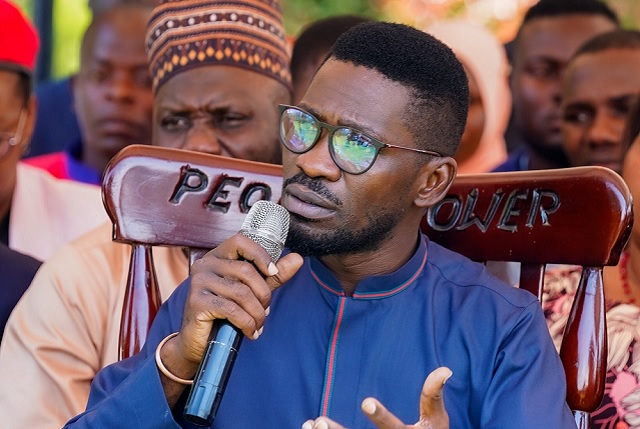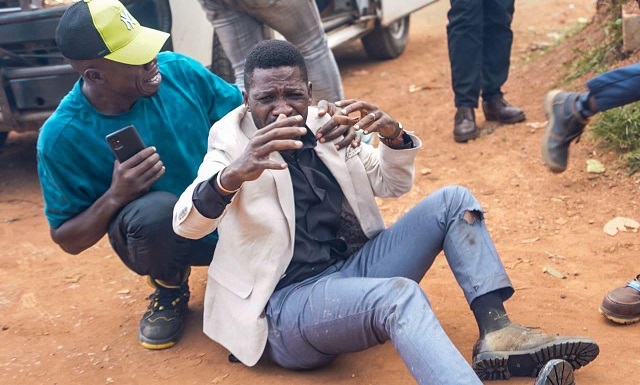
`We’re not pastors’ says police boss as he vows tougher action next time
ANALYSIS | IAN KATUSIIME | The assault on opposition leader Bobi Wine in Kampala where he was hit with a teargas canister causing a flesh wound on his left leg has heightened the political temperatures with fifteen months to go to the highly anticipated 2026 elections.
As soon as the attack on Bobi happened, there was reckoning over the incident due to the commonplace nature of violence in Ugandan politics. Was it premeditated? Did an individual police officer target the president of the National Unity Platform?
In an address on the shooting on Sept. 6, Bobi Wine said he was planning to sue the individual officers who assaulted him including Robert Kuzaara, the DPC of Kira Police Station, who was caught on video ordering “shoot” in reference to Bobi Wine.
The other officer NUP is targeting to sue is Elias Twesigye, who fired off the canister that injured Bobi. It is not the first time Twesigye is in the news for assaulting an opposition politician.
In January 2021, Twesigye was seen on video punching presidential candidate Patrick Amuriat during a scuffle between the candidate and police officers. At the time, Twesigye was OC of Mpigi police station.
The other officer Bobi named is a one Shadrack who he described as a former Wembley operative. Dressed in a black T-shirt and well-built, he is seen physically attacking unarmed NUP supporters on tape.
NUP have leveraged digital media urging their supporters to capture every moment as security forces mete out violence on them during political events.
In the latest altercation, Bobi was coming from a thanksgiving service at the home of NUP lawyer, George Musisi, in Bulindo, Wakiso district when police tried to disperse him and his followers with teargas and bullets. A blockade by police vehicles to halt Bobi and his entourage in their tracks was what sparked the commotion.
According to videos of the ensuing scuffle, as Bobi Wine leapt out of his vehicle, he was hit with a projectile and soon his bodyguard, Eddie Mutwe could be heard shouting “The president has been shot.”
Bobi Wine was lifted off by Mutwe and other aides into another vehicle where he was transferred to St. Francis Nsambya Hospital.
Videos show police descending on Bobi Wine’s entourage; beating and kicking them and later arresting some of the red-dressed vigilantes who form a ring around Bobi when he’s moving in crowded areas.
Police spokesperson Kituuma Rusoke at a press briefing fired off: “Why is it that demonstrators and rioters are not seen as enemies of the police? He added, “Our internal footage shows elements of an altercation between the Police and Kyagulanyi’s group, including stone throwing and police response to disperse the crowds.”
Nsambya hospital was also caught up in the kerfuffle. The Hospital had to refute an allegation against Bobi Wine making rounds on social media.
According to NUP spokesperson, Joel Ssenyonyi, Bobi Wine asked to be discharged after one night at Nsambya Hospital where he had been admitted after it was discovered by NUP vigilantes that state agents were lurking around the hospital. The agents were reportedly intimidating hospital staff and demanding access to Bobi’s room.
Uganda Police did not agree with the version of events presented by NUP. In the back and forth since then, the battle lines have now been drawn between the police and the opposition in a prelude of what to expect when the campaign season officially starts around this time next year.
Diaspora NUP supporters protest
The assault of Bobi Wine generated headlines and tapped into the political tensions that have been roiling Uganda for years. The attack also galvanized the People Power/NUP chapters in the diaspora who have been a vital source of support for the movement back home that is maligned by arrests, detentions and killings.
In Nairobi, the NUP chapter held a press conference denouncing the violence meted out on its leader Bobi Wine. The NUP chapter in Canada staged protests in Toronto against the escalating violence by the Ugandan government.
In a statement, the protesters, demanded “targeted Magnitsky sanctions against Yoweri Museveni, his family, and the military leadership responsible for decades of violence, abductions, torture, and extrajudicial killings of Ugandan citizens.”
The NUP chapter in Canada had been involved a face down with the Ugandan high commisioner Ruth Acheng weeks before. The latest demonstrations seemed like a sign of its growing strength akin to that of the US-based convocation.
Just hours before Bobi was injured, Director of Criminal Investigations Department, Assistant Inspector General of Police (AIGP) Tom Magambo warned explicitly that those intending to cause election chaos would be dealt with firmly. It was an unprompted remark that rather than calm the temperatures, spiked them.
The CID boss made the comments in the presence of the Director of Public Prosecutions, Jane Abodo. The two were attending a coordination meeting for CID/ODPP at the CID headquarters in Kibuli, Kampala.

“We will not sit down and smile as they burn the city. If you are planning anarchy, then prepare yourself. You don’t expect the Director CID to turn into a pastor. There are people who are meant to do spiritual work. But we are going to operate within the Constitution. That’s why the DPP is here, and she is going to guide me. And I don’t think anarchy is okay,” Magambo said.
As President Museveni closed the coordination meeting two days later, he steered clear of any election talk preferring to focus on corruption.
However just a day before he met with CID officers, the President promoted seven senior police officers to the rank of AIGP.
These were led by Frank Mwesigwa Director of Operations, Moses Kafeero director human resource development, Charles Kataratambi director legal services, Felix Baryamwisaki director of ICT, Hadijah Namutebi director of welfare, David Wasswa director counterterrorism, and Ubaldo Bamunoba director political commissar.
Of the seven, Mwesigwa’s appointment appeared to be the most significant because he is holding the same position he was in six years ago when he was the right hand man of former IGP Gen. Kale Kayihura.
With extra pips, Mwesigwa may be compelled to act high handedly in the face of the burgeoning influence of NUP—a party that has sprouted tremendously in stature and structure since it was founded four years ago—a headquarters in the city and dozens of representatives down the ballot.
For Musisi who has represented NUP in various court cases of missing persons, arrests and detention, he says it is more of the same.
“I saw the CID chief chest thumping about dealing with opposition, it was more of a political statement,” he told The Independent, “We saw a nasty election in 2021 and now we are seeing the hallmarks of another one in 2026.”
He says that everywhere the NRM government has been rejected, in places like Teso, northern Uganda, there has been violence. “When the government lost in central Uganda, we saw a lot of bloodshed, extrajudicial violence, so what happened to Bobi Wine is a bad sign for the future.”
Musisi says to avert the same kind of violence witnessed in the last elections would take influential figures like religious leaders to raise their voices and call to order for those in charge of state authority.
“We do not have to see a bloodbath just because of elections,” he says, adding that violence could happen on an ever bigger scale.
“We call upon institutions especially the courts which are at the forefront to ensure that the law is respected,” Musisi says. “We also call upon the Electoral Commission who are the principal managers of elections to do more…and other neutral arbiters to rise up to the challenge.”
Prelude of violent 2026
For NUP, there has been no respite. Every day presents a new challenge as party members are arrested, whisked away or face new charges. On the eve of the Gulu parliamentary sittings, three NUP officials; Brian Mungu, Sebastian Ogoni and Boniface Ocira were arrested after a raid on the NUP offices in Gulu.
On Aug. 1, Achileo Kivumbi, the head of security at NUP headquarters, was abducted by unknown security officials at night using a Toyota van registration number UAP 164P. He was charged with unlawful possession of defence stores in the General Court Martial. The state alleged that on Aug. 3, two days after Kivumbi was whisked off by security agents, he was found with lieutenant colonel pips; meaning that he got the pips when he was in state custody.
At this time in 2019, two years to the 2021 elections, the situation was no different: the state was trying to take the measure of People Power, the precursor to NUP and took no chances including a military deployment to Makerere University where People Power was establishing grassroots presence.
Projectiles were flying around figuratively with the emergence of People Power as a popular movement that galvanized urban youth and large parts of the country.
The violence that foreshadowed the election happened around the same time as it is happening today.
Ziggy Wine, an artiste, friend of Bobi Wine who was also a supporter of People Power had died in mysterious circumstances in August 2019. People Power and the government exchanged barbs and it set the stage for what lay ahead.
When in another incident shortly after, a young man called Baker Kasumba was pictured writhing in pain after two six inch nails were drilled in both his palms, the country had plumbed new depths of political violence. The scene sparked fears that Uganda could be headed for its most violent election. There were various occasions of violent arrests, shootings and brutality that sent shockwaves across the country.
There were shootings on November 18 and 19 where over 150 people were killed and bodies lay on the streets of Kampala as election violence reached its worst levels even by the country’s standards. To-date, no officer has been charged let alone a comprehensive report into the extrajudicial killings of those two days.
On December 30 2020, a police pick up vehicle ran over Frank Senteza, Bobi Wine’s bodyguard, and killed him on the spot. No officer has been charged either in the murder of Sentenza.
Five years later, and the country is back in the same spot.
 The Independent Uganda: You get the Truth we Pay the Price
The Independent Uganda: You get the Truth we Pay the Price





